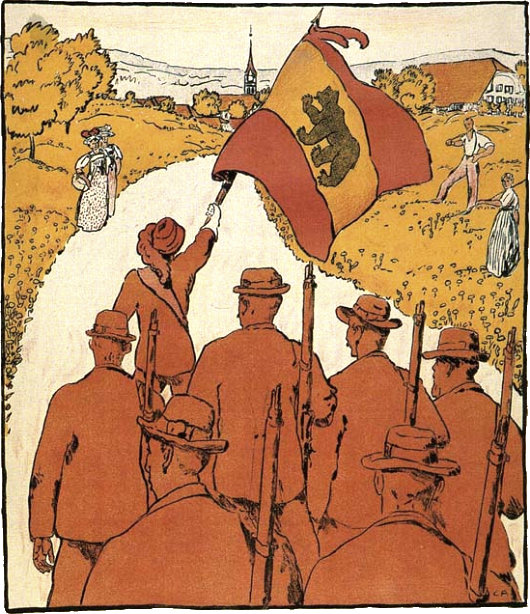Switzerland
About Andrew Cusack
 Writer, web designer, etc.; born in New York; educated in Argentina, Scotland, and South Africa; now based in London.
Writer, web designer, etc.; born in New York; educated in Argentina, Scotland, and South Africa; now based in London. read more
News
Blogs
Reviews & Periodicals
Arts & Design
World
France
Mitteleuropa
Knickerbockers
Argentina
The Levant
Africa
Cape of Good Hope
Netherlands
Scandinavia
Québec
India
Muscovy
Germany
Academica
The Swiss model
Harold James advocates scaling up small country democracy, if the members of the European Union are ever to succeed in settling upon a working model of democracy. He explains why the Swiss model of “Konkordanzdemokratie” has much to offer.
From Schweizer Monat via Eurozine.
SWISS PEOPLE TEND to regard their political, social and economic order as something quite unique, that cannot be replicated elsewhere. That is a pity. Switzerland would not only do other countries a terrific favour by exporting its political and social order; it would also help make its own existence more viable, in the midst of an environment that has become quite threatening. Exporting Swissness would be an act of self-interest and not just altruism.
The members of the European Union are in desperate need of a working model of federalism and of democracy. Are there any useful or instructive foreign models for modern Europe in its hour of need? The history of the United States has some appeal. Many Europeans now regularly cite Alexander Hamilton’s famous negotiation in 1790 of the assumption of state debts by the federal government as a model for how a United States of Europe might be created. But the actual turn of events is less than appealing. The individual states embarked on a borrowing binge in the late 1830s, that was then followed by widespread default in the early 1840s. The revenue stream that was used to service the federal debt – the external tariff – represented a necessary part of the Hamilton scheme that was also inherently and intensely conflictual, and proved to be a cause of increased tension between the American North and the South.
Situated in the heart of Europe, the Swiss experience might offer a superior example for modern Europeans. (more…)
Pure Democracy
“My firm conviction is that we of the conservative camp must put ourselves entirely onto a democratic basis. After the collapse of the old conditions nothing else can provide us with a future and a justification except pure democracy. Even if democracy has a dark side it is preferable to the quasi-democratic aristocracy of the representative system.” — Philipp Anton von Segesser, 1866
The Franco-Yorkshireman Jerome di Costanzo has an interesting article at OurKingdom on “You the People” Conservatism, interesting for the most part in that it has introduced me to Philipp Anton von Segesser, whom I had never heard of. I question, however, whether Jerome is correct to imply that Herr von Segesser and Mr. Cameron are quite such birds of a feather. The brilliance of the Swiss model — which Jerome rightly extols — is its democratic localism. But the Prime Minister is now seeking to introduce legislation which would set minimum prices for alcohol to avoid the almighty glut of cheap drink which (along with 24-hour openings) has contributed to the transformation of many British town centres into no-go-zones of public inebriation.
Would not the Swiss solution, instead, have been to merely devolve power either to counties (which barely exist anymore, and whose borders are in a state of permanent revolution) or to local town councils, and to allow them to react to the situation on the ground in a manner they deem appropriate?
Also, as Paul Mallinder points out, the government is attempting to solve a problem with a law, when really the only solution is a virtue. Virtues, though, are society’s responsibility, not the government’s. If people continually look to the government to solve problems by passing legislation instead of transforming society themselves by inculcating and promoting virtue, they deserve the nightmarish state they will end up with.
Search
Instagram: @andcusack
Click here for my Instagram photos.Most Recent Posts
- Faithful Shepherd of the Falklands April 8, 2025
- Articles of Note: 8 April 2025 April 8, 2025
- Proportionality Destroys Representation April 8, 2025
- Sag Harbor Cinema March 26, 2025
- Teutonic Takeover March 10, 2025
Most Recent Comments
Book Wishlist
Monthly Archives
Categories




